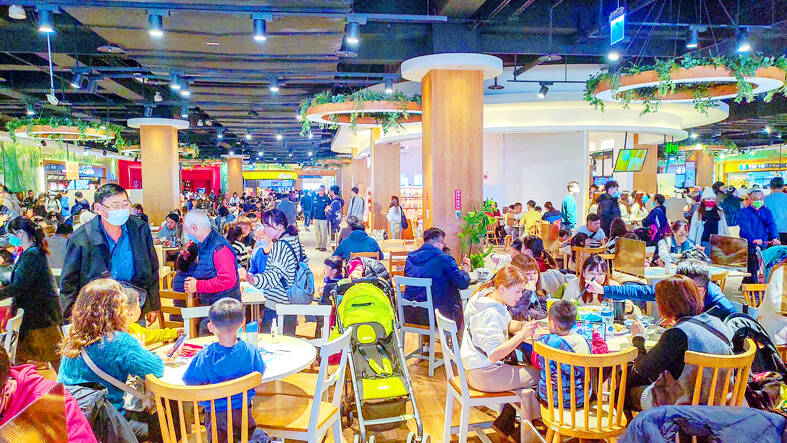A trial program is to limit air-conditioning at more than 1,300 establishments, where temperatures at meal times are to remain above 23°C, the Bureau of Energy said yesterday.
The trial would run until 2025 and complement regulations that since 2014 limit air-conditioning at 20 categories of establishments, with temperatures above 26°C, in a bid to reduce energy consumption in summer, the bureau said.
However, the regulations exempted restaurants and food courts in department stores from 7am to 9am, from 11am to 2pm and from 6pm to 9pm, it added.

Photo: Chang Hsuan-tse, Taipei Times
Operators that cool down their establishments to below 26°C face fines of NT$20,000 to NT$100,000 under the regulations, with repeat offenders facing higher fines.
However, fines imposed in the past few years showed there was “room for improvement,” a bureau official said yesterday.
The trial program would advise operators to cool down their facilities to about 23°C during meal times, the official said, adding that 1°C above or below the recommended temperature would also be accepted.
Bureau officials urged business owners to participate in the trial, saying that the agency would collect feedback from the public to ensure that people do not feel uncomfortable while dining in.
The trial would not impose additional fines, they added.
Some chain restaurant owners welcomed the announcement, saying that their target temperature has been 23°C to 24°C since higher food prices and electricity rates began affecting their business.
A chain restaurant public relations agent surnamed Chen (陳) said that restaurants inside malls cannot independently regulate their temperature, as they depend on the malls’ central air-condition systems.
However, the restaurants would try to comply with any new regulations, Chen said.
The bureau said that conference halls, previously unregulated, would also have to keep their temperature above 26°C.
The Taiwan External Trade Development Council, which manages the Taipei World Trade Center and the Taipei International Convention center, said it ensures that air-conditioners are set at “appropriate” temperatures to prevent excessive power use.

Taiwan yesterday denied Chinese allegations that its military was behind a cyberattack on a technology company in Guangzhou, after city authorities issued warrants for 20 suspects. The Guangzhou Municipal Public Security Bureau earlier yesterday issued warrants for 20 people it identified as members of the Information, Communications and Electronic Force Command (ICEFCOM). The bureau alleged they were behind a May 20 cyberattack targeting the backend system of a self-service facility at the company. “ICEFCOM, under Taiwan’s ruling Democratic Progressive Party, directed the illegal attack,” the warrant says. The bureau placed a bounty of 10,000 yuan (US$1,392) on each of the 20 people named in

A Chinese aircraft carrier group entered Japan’s economic waters over the weekend, before exiting to conduct drills involving fighter jets, the Japanese Ministry of Defense said yesterday. The Liaoning aircraft carrier, two missile destroyers and one fast combat supply ship sailed about 300km southwest of Japan’s easternmost island of Minamitori on Saturday, a ministry statement said. It was the first time a Chinese aircraft carrier had entered that part of Japan’s exclusive economic zone (EEZ), a ministry spokesman said. “We think the Chinese military is trying to improve its operational capability and ability to conduct operations in distant areas,” the spokesman said. China’s growing

The High Court yesterday found a New Taipei City woman guilty of charges related to helping Beijing secure surrender agreements from military service members. Lee Huei-hsin (李慧馨) was sentenced to six years and eight months in prison for breaching the National Security Act (國家安全法), making illegal compacts with government employees and bribery, the court said. The verdict is final. Lee, the manager of a temple in the city’s Lujhou District (蘆洲), was accused of arranging for eight service members to make surrender pledges to the Chinese People’s Liberation Army in exchange for money, the court said. The pledges, which required them to provide identification

Nine retired generals from Taiwan, Japan and the US have been invited to participate in a tabletop exercise hosted by the Taipei School of Economics and Political Science Foundation tomorrow and Wednesday that simulates a potential Chinese invasion of Taiwan in 2030, the foundation said yesterday. The five retired Taiwanese generals would include retired admiral Lee Hsi-min (李喜明), joined by retired US Navy admiral Michael Mullen and former chief of staff of the Japan Self-Defense Forces general Shigeru Iwasaki, it said. The simulation aims to offer strategic insights into regional security and peace in the Taiwan Strait, it added. Foundation chair Huang Huang-hsiung